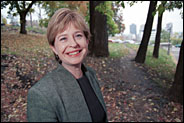Ruth Sandwell
Teaching Canadians about their past
History never made so many headlines as it did over the last year. A subject plagued by the image of fusty old men mumbling to disinterested students about other fusty old men was somehow the hot issue in education. The annual moaning in the press over how "Canadians don't know their own history" has become increasingly strident, and there is a movement afoot to radically reform how the subject is taught.
 |
|
Ruth Sandwell is right in the middle of all of this. On an experimental cross-appointment with the Department of History and the Faculty of Education, and funded by the McGill Institute for the Study of Canada, Sandwell comes to McGill with an established track record of teaching history in new ways.
"This position here at McGill is unique in Canada," says Sandwell, "It came out of the debates about the failure of the education system to teach Canadians anything about their past."
Sandwell comes to McGill from a fellowship at the University of British Columbia, where her specialty was rural history -- in 1999, she earned a postdoctoral fellowship from the Social Sciences and Humanities Research Council to study the cultural effects of electricity on the home between 1910 and 1960, for instance. At McGill, Sandwell teaches about the history of the Canadian family -- how notions about marriage and childhood have evolved.
As a teacher and historian, Sandwell pays close attention to the national discussion of what history education is supposed to achieve for Canadians. In fact, she just recently came back from a major conference of educators and historians in Winnipeg, where she got the sense that history education is already undergoing a sea change.
"It seems to me that what's happening in history education is a similar revolution to what happened in science education a couple of generations ago," she said. Science education moved from memorizing facts, formulas and phyla to learning scientific thought by practicing it in the lab.
"It seems to me that a similar thing is happening in history, and people are understanding that history is not a series of facts, it's not a package."
Sandwell believes that the best way to get students involved and interested in history is to give them ownership of it. The best way to do that is to put it in their hands. It is her conviction that history students have to learn to do history -- right from the primary documents. Reciting facts to high school students from a textbook is not "doing" history in the sense of creating potential historians.
Sandwell notes that her own classes require students to do at least one paper based on primary source material. In fact, the project that probably garnered her a reputation as an innovative educator was an experiment with very old documents in a very new format.
Five years ago Sandwell helped create a web site called "Who killed William Robinson?" which challenged web surfers to examine the evidence -- court transcripts, affidavits and testimony, all online -- to re-examine a murder that happened in B.C. over a century ago.
That site was used by educators all over the world to teach students about history, and Sandwell was rightly praised for it. However, she says that many students were frustrated by it -- she laughs to remember e-mails she received imploring her to just tell them who killed Robinson. Sandwell doesn't know, and that was the point.
"When I was teaching in British Columbia, students seemed to think there is a truth to history... The idea is if you can do the research properly you will find a single truth. That's not my idea of history, my idea is that it is a dialogue about the evidence."
Although many historians bemoan the state of Canadian history, Sandwell believes that the interest to learn it is there, if students are stimulated properly. Although recently there have been calls for the subject to meet national standards, no one is really sure what will make history education more effective. This is what Sandwell hopes to help answer at McGill.
"What I'm doing is working on effective ways to teach history as a process, to try to make it more interesting but also make it more meaningful."

